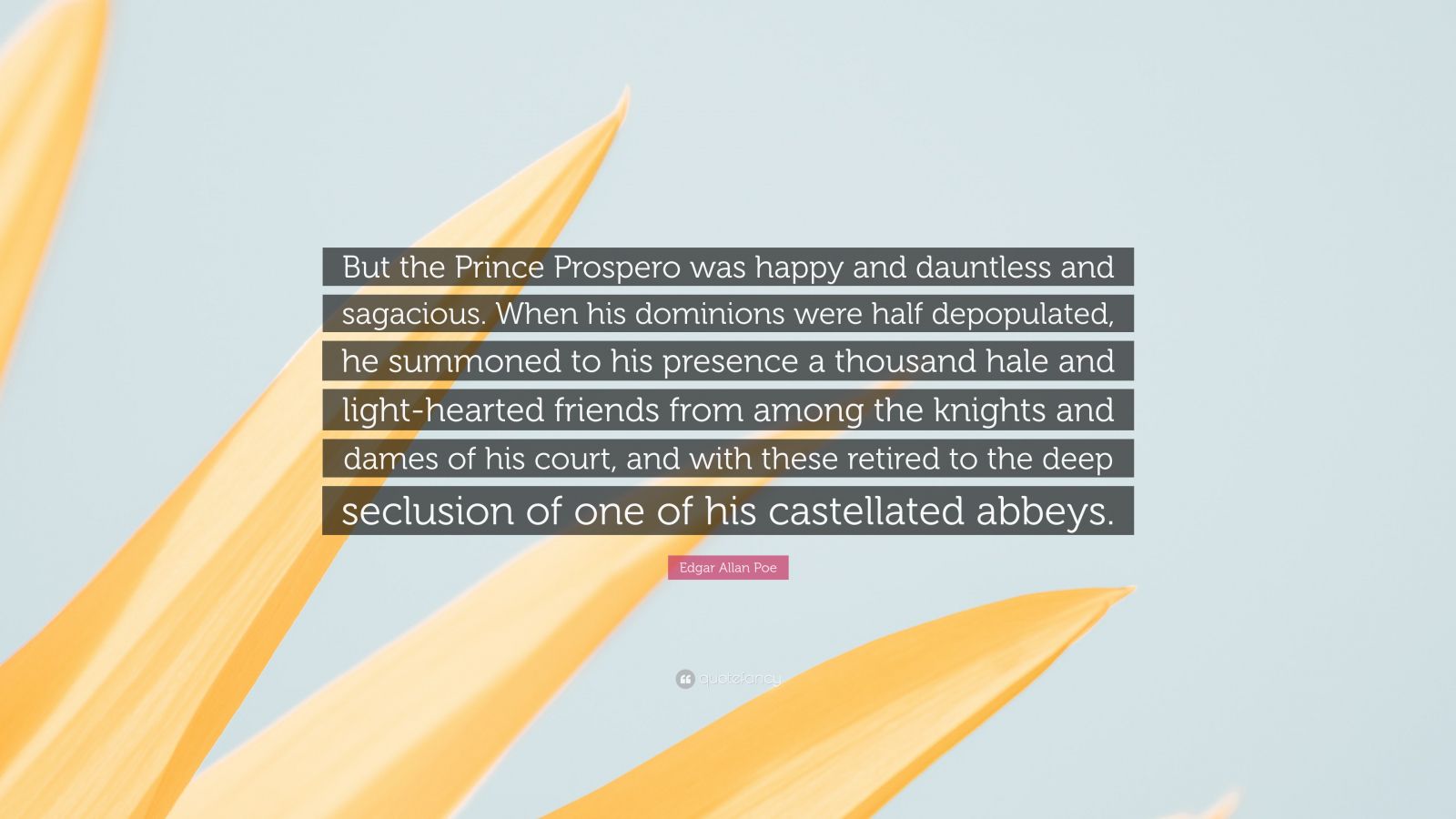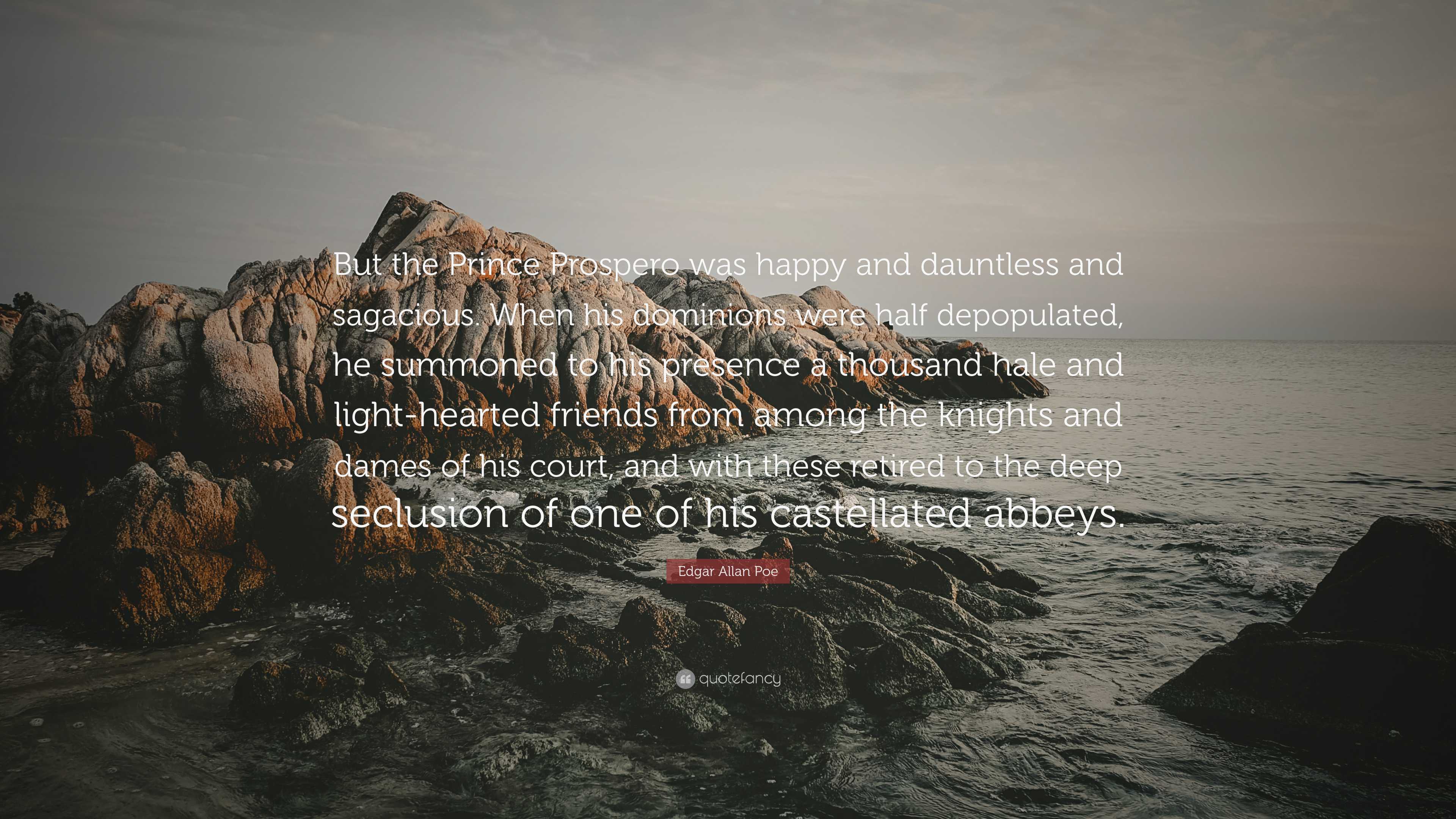**Exploring The Depths Of Prospero's Happiness, Dauntlessness, And Sagacity**
In the realm of literature, few characters encapsulate the essence of human emotion and strength like Prospero. When we reflect on the statement "prospero was happy and dauntless and sagacious. when his dominions were", we are compelled to delve deeper into the psyche of this remarkable figure. His journey through triumph and tribulation presents a tapestry of complex emotions and wisdom that resonates with readers across generations. The exploration of Prospero's happiness, courage, and wisdom unveils the layers of his character and the profound impact of his choices.
As we navigate through the intricacies of Prospero's life and dominions, we uncover a narrative that speaks not only to his personal growth but also to the broader themes of power, control, and redemption. His experiences serve as a mirror reflecting our own struggles with authority and the pursuit of happiness. When we speak of "prospero was happy and dauntless and sagacious. when his dominions were", we are not merely recounting a tale; we are engaging with the very essence of what it means to wield power responsibly while maintaining one’s integrity.
Furthermore, the lessons gleaned from Prospero's journey encourage us to reflect on our own lives. How do we achieve happiness in the face of adversity? In what ways can we be dauntless in our pursuits? And how can wisdom guide us through life's tumultuous waters? These questions are central to understanding Prospero's legacy, as we explore the themes of his dominion and the virtues he embodies.
**What is the Biography of Prospero?**
Prospero, the central character in William Shakespeare's play "The Tempest," is a complex figure whose life story is filled with intrigue and depth. He is depicted as a former Duke of Milan who was usurped from his position and banished to a remote island. Here, he harnesses the power of magic and learns to navigate the challenges of isolation and betrayal.
**Key Personal Details and Bio Data of Prospero**
| Attribute | Details |
|---|---|
| Name | Prospero |
| Title | Duke of Milan |
| Place of Birth | Milan, Italy |
| Occupation | Magician, Scholar |
| Notable Relationships | Miranda (daughter), Ariel (spirit), Caliban (servant) |
| Major Themes | Power, Betrayal, Forgiveness |
**How Does Prospero’s Happiness Manifest?**
Prospero's happiness is multi-faceted, deeply tied to his mastery over magic and his relationship with his daughter, Miranda. His joy is derived from the beauty of nature around him and the companionship he shares with Ariel and Miranda. However, it is also complicated by his longing for revenge against those who wronged him. This duality makes him a relatable character; after all, who hasn’t experienced happiness intertwined with sorrow?
**What Does it Mean to be Dauntless?**
To be dauntless is to embody fearless determination in the face of challenges. Prospero's dauntlessness is evident when he confronts his past and decides to reclaim his rightful place. His courage is not just in wielding magic but also in facing his former enemies, showcasing a strength that many aspire to emulate. His dauntless spirit inspires those around him and serves as a reminder that true bravery often lies in vulnerability.
**In What Ways is Prospero Sagacious?**
Sagacity is the quality of being wise, and Prospero exhibits this trait through his thoughtful decisions and understanding of human nature. His ability to manipulate events on the island demonstrates his keen insight into the motivations of others. This wisdom allows him to orchestrate his plan for reconciliation, illustrating that sagacity is as much about empathy as it is about intellect.
**How Does Prospero’s Control Over His Dominions Reflect His Character?**
Prospero's dominion over the island and its inhabitants reveals much about his character. Initially, he uses his power to exert control and exact revenge. However, as the narrative unfolds, he learns the value of forgiveness and release. This transformation signifies the growth of a character who was once consumed by bitterness into one who recognizes the importance of mercy. The shift from domination to restoration highlights the thematic evolution present in "The Tempest."
**What Lessons Can We Learn from Prospero?**
Prospero's journey offers profound lessons on the nature of power, the importance of relationships, and the path to self-discovery. From his initial state of despair to his ultimate realization of happiness and wisdom, readers can glean valuable insights into their own lives. Here are a few key takeaways:
- Embrace Change: Prospero’s ability to adapt to his circumstances teaches us the value of flexibility in life.
- Seek Forgiveness: The act of forgiving is a powerful step towards personal liberation.
- Understand Your Power: Recognizing the impact of our actions on others is crucial in any leadership role.
- Value Relationships: The connections we foster can be our greatest source of strength.
**Why is Prospero’s Legacy Important?**
The legacy of Prospero extends beyond the confines of the play. His character challenges us to reflect on our own dominions—be they personal, professional, or societal. The statement "prospero was happy and dauntless and sagacious. when his dominions were" serves as a reminder that true fulfillment comes from understanding ourselves and the world around us. As we navigate our own journeys, may we embody the qualities of happiness, courage, and wisdom that Prospero so richly exemplifies.
**Conclusion: What Can We Take Away from Prospero’s Story?**
In conclusion, the tale of Prospero is one of resilience, transformation, and depth. His happiness, dauntlessness, and sagacity are not merely characteristics; they are aspirations we can all strive for in our lives. The exploration of "prospero was happy and dauntless and sagacious. when his dominions were" invites us to reflect on our own experiences and the ways we can cultivate these virtues in our own dominions. As we continue to learn from Prospero, may we find our paths to happiness and wisdom illuminated by his timeless story.



ncG1vNJzZmixn6PAtr7IZqWeq6RjsLC5jq2pnqaUnruogY6pqairoJq%2FsHnWmqpmoJGlvbp5wKebZpyRqru1uMSsqmaZnpl6tK3Gmpqip6Woeri0xKdkoaGjYrGwucinoKimo2LEpr7EZ5%2BtpZw%3D